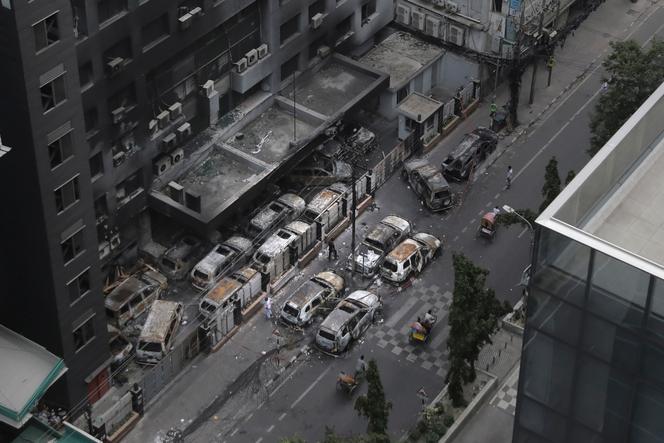


After three weeks of demonstrations, violently repressed by the authorities, a precarious calm reigned in Dhaka, the capital of Bangladesh, on the morning of Monday, July 22. The army was still deployed, and the curfew remained in force. Military and paramilitary personnel patrolled this megapolis of 20 million inhabitants on foot or in armored vehicles. As recently as Saturday, the police did not hesitate to open fire on thousands of people defying the curfew. "Even if it hasn't been officially declared, Bangladesh is in a de facto state of emergency," said Ali Riaz, professor of political science at Illinois State University.
On Sunday, in a gesture of appeasement, the Supreme Court reviewed the quota system for access to civil service jobs, which was at the root of the student-led protest movement. Only 5% of positions are now reserved for descendants of those who fought for the country's independence in 1971, compared with the previous 30%. Critics see this "positive" discrimination as a way of favoring the supporters of Prime Minister Sheikh Hasina.
Hasina, who has reigned unchallenged since 2009, has shown unprecedented brutality in her repression of the unrest. At least 174 people were killed in the space of six days, according to Prothom Alo, the country's highest circulation Bengali-language daily. This figure is provisional, as news from Dhaka is arriving very slowly. The government has imposed a veil of silence, raising fears of the worst human rights violations. Internet access has been interrupted since July 18 and cell phone services disrupted, making communication with the outside world virtually impossible. At least 532 people have been arrested in Dhaka, the police announced on Monday. Among them are leaders of the opposition Bangladesh Nationalist Party.
Will the revolt stop there? "We will not stop the demonstrations until a law is passed in Parliament," said Abdullah Saleheen, a spokesperson for the students, on Sunday. Their demands have evolved. They are now calling for the reopening of campuses, closed since July 16, but also for an investigation into the "murders" of students. "The anti-quota movement has been transformed into a regime protest movement," said Riaz. "Fearing violence, students may be reluctant to take to the streets again," said Naomi Hossain, a professor at the School of Oriental and African Studies in London. "But they won't forget what this regime has inflicted on them."
The government continued to add fuel to the flames. Rather than appease the anger of the youth, Hasina defended the quota system, believing that veterans deserved the utmost respect for their contribution during the war of independence. The "Iron Begum" preferred to mock the students demanding more justice in highly derogatory terms, comparing them to "razakars," Pakistan's "collaborators" in the 1971 liberation war. With such insults, she fanned the flames.
You have 52.53% of this article left to read. The rest is for subscribers only.
